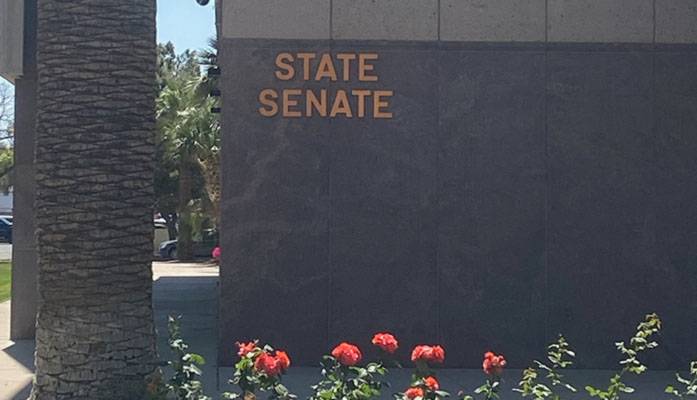
by Jonathan Eberle | Jun 23, 2025 | News
By Jonathan Eberle |
Arizona lawmakers have taken a significant step to strengthen protections for domestic animals with the final legislative passage of Senate Bill 1658, a measure designed to broaden the scope of what constitutes animal cruelty under state law. The bill, sponsored by Senator Shawnna Bolick, now heads to Governor Katie Hobbs for consideration.
SB 1658 aims to crack down on neglect and abuse by explicitly requiring pet owners and caregivers to provide essential care, including timely medical attention. The legislation adds legal consequences for those who intentionally, knowingly, or recklessly fail to prevent unnecessary suffering of animals under their custody or control.
“How we treat our animal friends says a lot about our society,” said Senator Bolick following the Senate vote. “There are too many stories of animal cruelty around Arizona, leading to the necessity of this legislation to help protect their well-being. These innocent animals are voiceless, but when they suffer, it speaks volumes.”
The measure passed both legislative chambers with bipartisan support. Advocates say the bill fills a critical gap in existing law by clearly defining minimum standards of care and reinforcing the responsibility of animal owners to act in the best interest of their pets’ health.
Dr. Steven Hansen, President and CEO of the Arizona Humane Society, praised the bill’s advancement. “This landmark victory is a powerful testament to what can be achieved when passionate individuals come together to champion change,” Hansen said. “It would not have been possible without the tireless efforts of our steadfast advocates who stood up for the voiceless… and the fierce leadership of the bill sponsor, Senator Shawnna Bolick.”
SB 1658 will mark a significant milestone in Arizona’s efforts to prevent animal abuse and promote responsible pet ownership.
Jonathan Eberle is a reporter for AZ Free News. You can send him news tips using this link.

by Jonathan Eberle | Jun 23, 2025 | News
By Jonathan Eberle |
Arizona voters will weigh in next year on a proposed constitutional amendment that would bar the state and local governments from taxing drivers based on how many miles they travel, as well as from placing limits on an individual’s vehicle mileage.
The proposed amendment, which will be placed on the November 2026 ballot, would make Arizona the first state in the nation to constitutionally prohibit vehicle miles traveled (VMT) taxes and related mileage restrictions.
VMT taxes—also referred to as mileage-based user fees—charge drivers a per-mile fee for use of public roads. While proponents argue the system offers a fairer alternative to traditional gas taxes, especially as electric vehicles become more common, opponents have raised concerns about privacy, government overreach, and potential impacts on rural and suburban drivers.
Currently, 24 states are testing or have launched VMT programs, according to the Tax Foundation. Most are voluntary and focus on electric or hybrid vehicles. Only Hawaii has a mandatory VMT program scheduled to take effect in stages, beginning with electric vehicles by 2028 and light-duty vehicles by 2033. Oregon was the first to implement a voluntary VMT system in 2015.
Supporters of Arizona’s constitutional amendment say it’s a preemptive strike to protect driver freedom and block what they see as a growing trend of government intrusion.
“As we have seen in other states, governments left to their own devices will succumb to radical attempts to track, tax, or limit their citizens’ transportation miles,” said Scot Mussi, president of the Arizona Free Enterprise Club, which has long opposed VMTs. “The Arizona Free Enterprise Club has been fighting for the Freedom to Move Act since 2023,” Mussi added. “We are thrilled that our Republican-majority legislature chose to give voters the ability to protect their way of life by preserving our freedom to travel by personal vehicle in our state.”
SCR 1004 marks the legislature’s second attempt to advance such a measure. A similar proposal—House Concurrent Resolution 2018—passed the House in 2024 but failed in the Senate in a 15–15 tie. Under Arizona law, constitutional amendments approved by the legislature do not require the governor’s signature to go to the ballot.
SCR 1004 is the first measure officially certified for the 2026 ballot. Lawmakers are still considering 20 other proposals—eight constitutional amendments and 12 referred statutes—that could also appear before voters next year. If voters approve SCR 1004, Arizona would become the first state to embed a ban on VMT taxes and mileage limits into its constitution—setting a potentially influential precedent in the national transportation policy debate.
Jonathan Eberle is a reporter for AZ Free News. You can send him news tips using this link.

by Jonathan Eberle | Jun 22, 2025 | News
By Jonathan Eberle |
A scheduled confirmation hearing for Karen Lee Peters, Governor Katie Hobbs’ nominee to lead the Arizona Department of Environmental Quality (ADEQ), was abruptly postponed on Wednesday by the Senate Director Nominations Committee.
Committee Chair Sen. Jake Hoffman (R-Queen Creek) announced the delay just hours before the hearing was set to begin, citing unresolved questions about certain aspects of Peters’ background that surfaced during the vetting process.
“Based on possible discrepancies with information relating to items we vetted, further clarification is necessary prior to holding Ms. Peters’ confirmation hearing,” Hoffman said in a written statement. He did not specify the nature of the discrepancies, nor whether they pertained to Peters’ previous professional experience or policy positions.
The postponement also came as the Arizona Senate worked to advance the state budget, which Hoffman noted was straining staff capacity.
“Given the Senate attempting to move the state budget today, our staff is stretched thin, and it is best to simply table the nomination for now,” Hoffman said. “I have communicated to Hobbs’ staff that we will reschedule her hearing soon.”
Peters’ confirmation is one of several being closely watched, as the Republican-controlled Senate continues to scrutinize the Democratic governor’s nominees for key state agencies.
Jonathan Eberle is a reporter for AZ Free News. You can send him news tips using this link.

by Jonathan Eberle | Jun 22, 2025 | News
By Jonathan Eberle |
With less than two weeks before Arizona’s fiscal year ends, a deepening budget dispute between the state House and Governor Katie Hobbs escalated Saturday, as House Speaker Steve Montenegro announced plans to introduce a continuation budget to keep state government running past the June 30 deadline.
Montenegro said the House would move forward with a stopgap measure after determining that the Senate-passed executive budget, negotiated by Hobbs and Republican Senate leaders, lacks sufficient support to clear the House.
“The executive budget plan passed in the Senate does not have the votes in the House—with bipartisan opposition from Republicans and Democrats,” Montenegro said. “Now, with time running out and no viable path forward for their plan, it’s our responsibility to act to prevent a shutdown.”
He added that House Republicans had already passed their own budget last week, which he said focused on public safety, infrastructure, and government accountability—but that proposal was “ignored by the Senate.”
“The House is not going to be forced into a take-it-or-leave-it deal that doesn’t reflect the will of our members or the people we represent,” Montenegro said. “We will do what responsible legislators should do: take action to keep government running and protect Arizona taxpayers.”
A continuation budget, currently being drafted, would maintain current funding levels to preserve essential government operations while lawmakers continue to negotiate. However, the governor swiftly condemned the plan and signaled she would veto any such proposal.
In a statement, Governor Hobbs accused House Republicans of abandoning bipartisan talks and attempting to “jam through an irresponsible and partisan ‘budget.’”
“For months I have worked with leaders of both parties, in both chambers, to craft a bipartisan, balanced, and fiscally responsible budget,” Hobbs said. “Sadly, House Republican leadership abdicated their responsibility and refused to meaningfully participate in those bipartisan conversations.”
Hobbs warned that the continuation budget would gut pay raises for state troopers and firefighters, slash childcare and education funding, raise taxes on small businesses, and eliminate key investments in veterans’ services and wildfire mitigation.
“Speaker Montenegro knows this, yet he has chosen to continue with this farce as an exercise in pointless political grandstanding,” she said. “His reckless actions jeopardize basic government functions with potentially devastating consequences.”
The governor also criticized House Republicans for seeking an increase in their own per diem pay while proposing cuts to public safety and education programs.
“This irresponsible House Republican budget will raise costs and make our state less safe, less secure, and less competitive,” she added. “It’s time for House Republican leadership to come back to reality, stop wasting everyone’s time, and show some common sense by working with their colleagues in a productive fashion.”
With the June 30 deadline approaching, the battle over Arizona’s budget now hinges on whether either side can reach a new agreement—or whether the impasse will trigger a government shutdown.
Jonathan Eberle is a reporter for AZ Free News. You can send him news tips using this link.

by Jonathan Eberle | Jun 19, 2025 | News
By Jonathan Eberle |
Arizona Senate Republicans introduced a new state budget proposal Monday that aims to deliver a balanced fiscal plan while investing in public safety, education, infrastructure, water, and public health — all without raising taxes.
Senate leaders emphasized that their budget reflects bipartisan priorities and presents a path forward to avoid a looming government shutdown.
“This is a bipartisan budget the Republican majority can fully support and the governor will sign,” said Senate President Warren Petersen. “We are protecting the interests of Arizona by boosting pay for public safety personnel and increasing public safety resources to support safer communities.”
Petersen added that the proposal includes key investments in transportation and infrastructure, with a focus on road projects that support economic growth. The budget also addresses water security and enhancements to Arizona’s public health system.
“The governor has been adamant she will veto the House budget,” said Senate Appropriations Chairman John Kavanagh. “With the possibility of a government shutdown in a matter of days, we must move forward with our conservative spending plan, and we’re calling on our colleagues in both chambers to support it.”
Senate President Pro Tempore T.J. Shope offered a blunt assessment of the House proposal, describing it as a “fantasyland budget.”
“Elections have consequences,” Shope said. “We are in an era of divided government, and we must proceed as such. Republicans can’t get everything they want, and neither can Democrats. We did very well with protecting and funding our Republican priorities.”
Lawmakers face a deadline to approve a spending plan before a potential government shutdown later this week.
Jonathan Eberle is a reporter for AZ Free News. You can send him news tips using this link.





